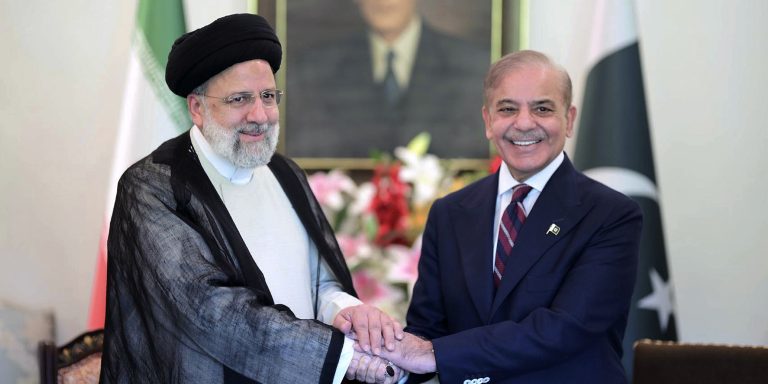INTELBRIEF
April 24, 2024
IntelBrief: Iranian President Raisi Travels to Pakistan to Smooth Over Bilateral Relations

Bottom Line Up Front
- Iranian President Ibrahim Raisi traveled to Pakistan earlier this week to meet with Pakistani Prime Minister Shehbaz Sharif and to smooth tensions lingering from a skirmish between Tehran and Islamabad that erupted after Iran launched missiles into Pakistan, with Pakistan returning fire.
- There was no mention of longstanding plans to link the two countries through a pipeline to export Iranian natural gas to Pakistan; the agreement was initially signed in 2009, but Pakistan has not moved forward with further construction out of fear of being sanctioned by the United States.
- In the wake of the so-called counterterrorism strikes which contributed to the tensions between Tehran and Islamabad, a joint statement between Iran and Pakistan vowed to cooperate with one another to counter terrorism, especially along the shared border region.
- Given Pakistan’s tumultuous relationship with India and Afghanistan, Islamabad feels compelled to mend relations with Iran, so it does not have hostile neighbors on most of its borders.
Iranian President Ibrahim Raisi traveled to Pakistan earlier this week to meet with Pakistani Prime Minister Shehbaz Sharif and to smooth tensions lingering from a skirmish between Tehran and Islamabad in January that erupted after Iran launched missiles into Pakistan, with Pakistan returning fire. Iran claimed that it was targeting Jaysh al-Adl, while Pakistan claimed that it was targeting Baloch separatists that have launched attacks on Pakistani soil. During that exchange, each side accused the other of supporting militants residing on the others’ territory. During his visit, Raisi also met with Pakistani Army Chief General Asim Munir and traveled to both Karachi and Lahore. The three-day trip saw multiple pacts and memorandums of understanding signed between the two countries and a pledge to increase bilateral trade from $2 billion annually to $10 billion. There were overtures related to combating terrorism, organized crime, and drugs, especially to crack down on illicit cross-border trade. Discussions also touched upon the war in Gaza and Raisi and Sharif agreed upon the need to achieve a cease-fire.
There was no mention of longstanding plans to link the two countries through a pipeline to export Iranian natural gas to Pakistan. The agreement was initially signed in 2009, but Pakistan has not moved forward with further construction out of fear of being sanctioned by the United States. However, Pakistan announced at the end of March that it would ask the United States to relax potential sanctions, following Iran’s threat of legal action against Pakistan, along with an $18 billion fine, for failing to meet the September 2024 deadline to finish construction on the Pakistani side. Following Pakistan’s announcement, a spokesperson from the U.S. State Department declared that the U.S. does not support the pipeline, stating “we always advise everyone that doing business with Iran runs the risk of touching upon and coming in contact with our sanctions, and would advise everyone to consider that very carefully.” That statement will provide fodder for those inside Pakistan's government and defense establishment who criticize Washington for what they see as meddling too frequently in internal Pakistani affairs.
According to a joint statement, the two countries have vowed to cooperate with one another to counter terrorism, especially along the shared border region. Pakistan has experienced a recent increase in militant violence, reportedly by Tehreek-e-Taliban Pakistan (TTP) and other insurgents targeting security forces in Pakistan – such as an attack by the militant organization Jaish-e Muhammad in March which left seven Pakistani soldiers dead. The TTP has increased its attacks in Pakistan over the last two years since the Taliban’s return to power in Afghanistan. Moreover, tensions around Pakistan’s borders have exacerbated internal security issues and potentially had a negative impact on trade or investment in the country, heightening the need for Islamabad to ease tensions with Iran.
Given Pakistan’s tumultuous relationship with India and Afghanistan, Islamabad feels compelled to mend relations with Iran, so it does not have hostile neighbors on most of its borders. Islamabad and Tehran share cultural and religious ties, as tens of thousands of Shias travel from Pakistan to Iran each year for pilgrimage. The countries also share a 900-kilometer border. According to a statement released by the Iranian presidential office, “The Islamic Republic of Iran, in line with the neighborhood policy … is interested in promoting relations with Pakistan and during this trip, various issues including economic and commercial issues, energy and border issues” were discussed with the Pakistanis. Iran maintains close relations with China, Russia, and myriad Central Asian states, so Raisi’s visit should be viewed through this lens, with Tehran attempting to solidify alliances on the heels of dramatic escalation with Israel following its recent drone and missile barrage. Historically, however, Pakistan has maintained close relations with Iran’s regional rival, Saudi Arabia. Still, considering Pakistan’s tenuous political, security, and economic situation, Islamabad needs as many allies as it can get in its corner, and thus remained eager to welcome Raisi to discuss further cooperation with Iran.